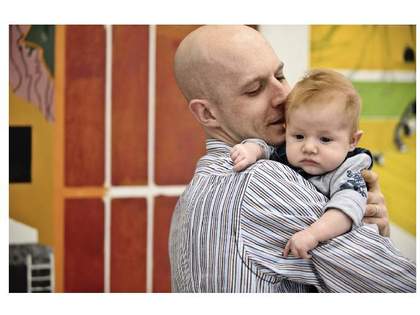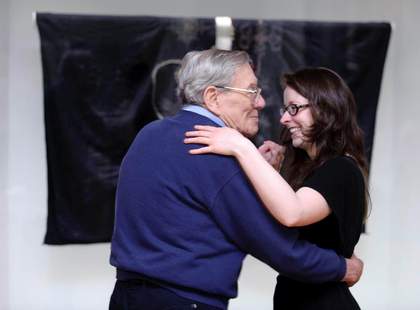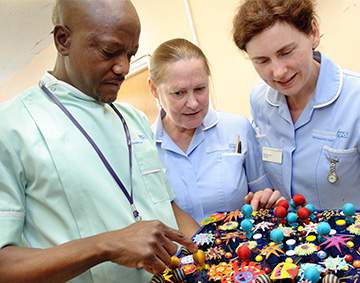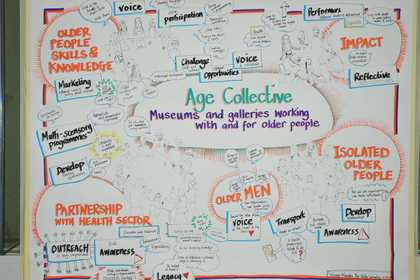As a university gallery, the Whitworth aims to bring together internationally significant collections, contemporary artists and the intellectual capital of our university to develop a unique and challenging programme of exhibitions, activities and learning opportunities. They are used by over 1000 researchers a year. A strong emphasis is placed on facilitating research on collections and both sites have dedicated research facilities, as you might well expect from a university museum and gallery.
The Whitworth and Museum are also well known for their approach to generating new and imaginative ways of working with non-traditional audiences and it is this, rather than collections-based or artist-led research that I am going to explore.
Multi-generational approach
Working with researchers underpins learning and engagement practice across all age brackets. Our award-winning early years programmes draw upon academic expertise in the field of early childhood. In addition to supporting a collaborative PHD in object-based learning in museums, the museum is an impact champion within LUCID (International Centre for Language and Communicative Development), an ESRC funded programme across northern England, exploring how different environments affect language acquisition in young children. Researchers observe and evaluate museum-based early years programmes and alongside the University’s Child Study Centre and with the children and parents/carers themselves, we co-develop research, pilot resources and activities.
We believe that engagement with research from the outset develops our understanding, enriches programme development and embeds a critical, reflexive approach. In 2012, the Whitworth won the Clore Award for Learning for its work with early years and spent the £10,000 prize money on culturebabies, a programme for under twos.

A participant at Culturebabies at the Whitworth
©Whitworth
We developed a series of seminars to explore how babies see, think and learn, bringing together some of the country’s leading researchers. They shared findings from the field of infant science about how babies sense the world around them. Using eye trackers and a range of baby monitors, infant scientists have measured eye movements and looked at how babies respond to faces (they prefer ‘beautiful’ faces), objects (they prefer curves) and colour.1 We learnt how babies are budding physicists, seeking to understand their physical world through experimentation and how, even at six months, they can predict the trajectory of moving objects. Finally, after showing film of a baby imitating Beyonce dance moves, we learnt about their capacity to learn and remember. Indeed, Dr Franklin from University of Sussex’s Babylab, suggested that ‘babies are the ideal museum visitor’ – someone who can sense and perceive, respond to beauty, recognise things, reason about objects and learn and remember.2 Two flagship programmes Artbaby and Baby Explorer were developed in response to this; engagement with research as an integral part of the process.
This holds true across our learning programmes. The Museum’s Real Life Science programme exemplifies this. It is a hands-on, museum collection based, secondary and post sixteen science programme that showcases cutting edge research and real life applications of science, using postgraduate demonstrators as educator and career role model. Current subjects include human evolution, adaptation, sustainability and forensic science. Recently awarded the prestigious Lever Prize, Real Life Science has strong links with contemporary academic research and all of the workshops are delivered by scientists from across the university.
Moving from children to later life, a significant focus of our age friendly work (over 50s) focuses on building a dialogue between culture, interdisciplinary research, practitioners and older people. We are uniquely placed to connect with and learn from the work of MICRA (Manchester Institute for Collaborative Research into Ageing), which promotes interdisciplinary research on all aspects of ageing. The Institute acts as an information hub for research on ageing, linking academics across the University of Manchester and serving as an entry point for those interested in its research. Our partnership with MICRA includes hosting regular events and seminars and co-developing research and evaluation programmes, such as Coffee, Cake and Culture.
Moving beyond the education sector
Coffee Cake and Culture is a good example of a multi-disciplinary programme that brings together health and social care partners, researchers, museums and the individual. It was developed from a pilot and feasibility study carried out over a six month period in 2012. During the pilot study, the museum and Whitworth worked on a programme of outreach and in-reach activities with residents with early on-set dementia, from a residential care setting and a supported housing venue.
Coffee, Cake and Culture offers stimulating, creative and social sessions developed for people living with dementia and their carers.

Image of participant during Coffee, Cake and Culture session
©Whitworth
This programme of fully supported visits is facilitated by gallery staff and aimed at groups in which people living with dementia receive support; from a care home, hospital setting or supported housing community. It reaches those least likely to participate by targeting groups through local health and care networks.
Close working with researchers from the University of Manchester’s Dementia Ageing Research team shaped the design and evaluation of the programme. The focus throughout was on creative capacity rather than reminiscence, memory or recall. Professor Brenda Roe from the School of Nursing, Midwifery and Social Work carried out the feasibility study. This aimed to identify the potential impact on the health and wellbeing of the residents and if there were additional benefits for the carers. Seventeen residents, ten care staff and one family member attended the sessions. She concluded that ‘the programme encouraged creative arts, cultural appreciation and social engagement which, in turn promoted wellbeing, quality of life and social inclusion’.3
Coffee, Cake and Culture sits within a larger museum/gallery engagement programme focused on heath and culture. The Health and Culture website Established in 2008, our health and culture programme focuses on delivering projects and programmes in collaboration with the Central Manchester University Hospitals NHS Foundation Trust and the Manchester Mental Health and Social Care Trust.4 This includes work with Manchester Schools Hospitals Service, ward-based creative sessions with patients, artist residencies, medical staff CPD programmes and postgraduate placements.

Cultureshots at Central Manchester hospitals
©Whitworth
Once a year, we run +Culture Shots, a week-long takeover of Central Manchester University Hospitals in which museums from across the city, led by the Whitworth and Manchester Museum, run workshops, activities and events for NHS staff and their visitors to explore how culture can enhance individuals, professional practice, and patients’ health and well being. Last year over 2,000 NHS staff participated in +Culture Shots. In 2012, we received two awards from the Royal Society of Public Health for innovative and outstanding contributions to arts and health practice and research. Judges commended our collaborative work with doctors, researchers and patients and our approach, focused on taking a psycho-social (rather than clinical) evaluation of cultural engagement and wellbeing. We are currently working with leading academic researchers in health and wellbeing to develop a new approach to longitudinal, mixed methods, evaluation of this work.
Beyond the academy, we also work closely with economic and SROI research and evaluation practitioners. For example, Inspiring Futures (led by Manchester Museum, in partnership with IWMN) a socially engaged volunteering programme funded by the Heritage Lottery fund, draws upon NEF National Accounts of Wellbeing and NICE QALYS (Quality Adjusted Life Year Values) as part of its SROI methodology, evaluating the impact of heritage volunteering upon social isolated individuals, families and communities.5 Led by research organisations from the housing and social care sectors, this work explores the social, economic and environmental impact of our work.
Care and share
In addition to drawing upon evidence to shape programmes, we have focused on how to work most effectively to bridge the gap between academic research, policy and practice using the context of the museum/gallery. Work with university academics has sought to share research and findings with a wider public (public engagement) and highlight the role of the museum and gallery as sites of exchange and ideas. We have a wide-ranging programme of public engagement (from talks and lectures to workshops and family-friendly festivals) where researchers, especially ECRs share their work. We also hold bi-annual catalyst events or cross-sector seminars and research is a critical element in these.
We have held cross-sector seminars/catalyst events, on age friendly museums (partnership with British Museum and Age Collective)

taken from Age Collective Museums cross-sector seminar
©Manchester Museum
dementia and intergenerational learning (with MICRA); and creativity and stroke (with the Stroke Association and University of Manchester Stroke Research team). Our next event will focus on social isolation and older men (with MICRA and Age-friendly Manchester).
This methodology embraces the notion of research as a
…process of steps used to collect and analyse information to increase our understanding of a topic or issue.6
These events use an ‘Open Space’ technique to enable collaborative discussion (open space is an approach which focuses on specific purposes or tasks but begins without a formal agenda, therefore creating time and space for people to engage deeply and creatively around issues that concern them). The Creative catalyst event, developed with the Stroke Association and the University of Manchester’s Stroke Research team brought together over 70 stoke clinicians and researchers, stroke survivors and carers, artists and cultural organisations to explore the role of arts in stroke prevention, care and recovery. The museum-based event started with two provocations; one from Inger Wallis, a stoke survivor; the other from Professor Pippa Tyrrell, Professor of Stroke Medicine and an Honorary Consultant in Stroke Medicine at the Comprehensive Stroke Centre at Salford Royal Foundation Trust. The discussion was wide ranging (across research, policy and practice) and highlighted synergies, gaps and the potential for collaboration. The Whitworth will soon launch its own Stroke Café, a partnership with the Stroke Association and a direct outcome of Creative Catalyst. However, the main purpose of these events is not to create new activities but to build relationships and understanding between sectors, develop a shared language and embed engagement with quality research from the outset.
We have developed an approach where research partnerships are the primary driver for the development of programmes, including many of our exhibitions. We also have new dedicated spaces for research; at the Whitworth, the entire ground floor of the new parkside extension is dedicated to learning and research. The Study Centre encourages up close and personal study of collections, the Collections Centre is a flexible space to share and display insights into and from the collection and will host informal events, seminars and discussions and the Clore Learning Studio is a space for play and exploration of materials and processes.
At Manchester Museum, the entire third floor is currently being transformed into a space themed entirely around ‘research’. By embracing the research process – encouraging visitors to ask and answer their own questions - university museums can become ‘experiments in how to elicit wonder, curiosity and continued interest’.7 This space, entitled ‘The Study’ extends the hugely successful inquiry-based learning approach used with schools and colleges, into a public research space for all visitors, with collections at its heart.
Research is at the heart of what we do. I believe it underpins learning at all levels, including action research undertaken by children, artists, educators and collections-based research by academics and the wider public. The learning and engagement teams are actively encouraged to embed research within their programmes and seek academic partners and critical friends across the university. The aspiration is that the insight and confidence gained from doing this will result in activities and programmes which remain deeply serious in intent (and critically considered) yet are rendered with a lightness of touch, engaging and playful in their execution.
Author
Esme Ward is the Head of Learning and Engagement across both organisations. leading on learning, engagement and visitor teams and developing programmes, events, projects and resources. Ward also co-teaches an MA module on Creative Learning and is currently supervising a PhD student exploring social media and digital engagement in museums.
